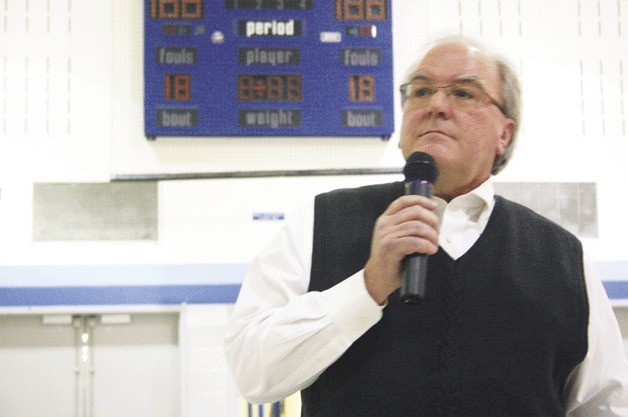A ferry terminal in Mukilteo will remain in Mukilteo, if the traveling public has its say.
“We’ve heard loud and clear that 98 percent of our customers prefer it stay in Mukilteo,” David Moseley, assistant secretary for Washington State Ferries said in Langley on Monday night.
But that’s long-range planning, Moseley said. The ferry system has a more immediate problem: money.
“These are very tough times,” he told more than 100 people filling the bleachers in the Langley Middle School gym. “Our message is not a happy message.”
“The ferry service is not financially sustainable for the next few years,” Moseley continued. “It’s been that way for a while, and it could get worse.”
Moseley spoke at the latest in a series of community update meetings held throughout Puget Sound to outline efforts to come up with ways to cut $17 million from the system’s budget for the next two years.
He said $14 million could be saved by proposed service cuts throughout the system.
Those cuts would include the elimination of the 1 a.m. final roundtrip of the night on weekdays on the Clinton-Mukilteo route.
They would also include elimination of two-ferry service in the summer between Keystone and Port Townsend, by stationing the state’s newest 64-car ferry M/V Salish, currently undergoing sea trials, in the San Juans.
The Salish originally had been promised to the Coupeville (Keystone)-Port Townsend route, joining another new ferry, the M/V Chetzemoka.
But concerns that the ferry system would move its Mukilteo terminal to Edmonds or Everett have been mounting on South Whidbey since long-range planning resumed this summer.
Planners have identified nine options for the terminal, including keeping it where it is, updating it or moving in further down the waterfront. Options also include moving it to Edmonds or Everett, raising fears of longer commutes and increased waiting times between sailings.
“Keep this up, and there won’t be anybody living on this island,” came a call from the bleachers.
But Moseley said the message was clear that moving the terminal out of Mukilteo is a no-no. He said planners are following federal guidelines in exploring all options, and that the next step is to whittle the list of possibilities to three or four “workable” ideas.
“This is just the beginning of the process, not the end of the process,” he said.
Moseley said that in any case, unless federal money can be obtained, nothing can be done anyway to implement a long-range plan for the terminal, since the ferry system is struggling just to maintain most of its current services.
“It’s not just a Mukilteo-Clinton problem, or a Port Townsend-Coupeville problem,” he said. “We have a structural, systemic problem.”
He said the ferry system must either find new ways of doing things, find a guaranteed revenue stream or make further reductions in service.
“I don’t know of a fourth option,” he said.
Moseley said management and administrative costs have already been reduced as much as possible, and that remaining cuts must come from areas “which we don’t have the ability to control very much.”
He said vessel and terminal operations, including fuel, labor and other costs, total $341 million, amounting to 80 percent of the system’s two-year budget.
Another $63 million, or 15 percent of the budget, goes for vessel and terminal maintenance, he said.
Moseley said that since 2000, the ferry system has been subsidized by $80 million per year from the state’s motor vehicle funds, which includes gas-tax money.
He said that since 2007, the system has been able to save $55.4 million, but that more is being requested by Gov. Christine Gregoire as she prepares her budget for the next biennium.
Moseley said the state Department of Transportation has been requested to reduce its budget for the next two years by $212 million, and that the ferry system’s share is $17 million, which he called “more than fair.”
He said given the decline in motor vehicle fund revenues, and the financial problems of other areas of state government, things could get even worse.
“We’re in very, very difficult times,” Moseley said. “It’s likely we’ll see further reductions in service.”
He said a final decision on the ferry service budget will be up to the Legislature, as will the implementation of any cuts.
That includes the fate of the Salish in regard to the Coupeville (Keystone)-Port Townsend route.
“There’s a very powerful lady in Olympia who wants to keep it there,” Moseley said, referring to Sen. Mary Margaret Haugen, D-Camano, chairwoman of the Senate Transportation Committee.
Meanwhile, Moseley said the Legislature has approved a 2.5-percent increase in ferry fares, and that they will go into effect if they are found to fit with the recently passed Initiative 1053, which requires a 60-percent majority vote of the Legislature to increase taxes and fees.
On another issue pertaining to Mukilteo, Moseley said the terminal would be closed for maintenance Fridays, Saturdays and Sundays on the last two weekends in March and the first weekend in April.
He said regular ferry service to and from Clinton would be rerouted to Edmonds during those weekends.
“The trouble with the Mukilteo terminal is that it’s old, it’s tired and it requires constant maintenance,” Moseley said.
Before the meeting started, Dave Hoogerwerf of Clinton, chairman of the local Ferry Advisory Committee, urged the audience not to shoot the messenger when it comes to the troubles of the ferry service.
“Don’t take it out on David,” Hoogerwerf said of Moseley, urging those in audience to take their concerns to Olympia instead.
“There are some things he’s not too happy about either,” Hoogerwerf said.
The crowd appeared to take the advice to heart, and but for a few outbursts, generally went easy on Moseley.
Moseley himself, however, didn’t hear Hoogerwerf’s plea. He had missed the ferry in Mukilteo and didn’t arrive until about 15 minutes before the meeting was scheduled to begin.



